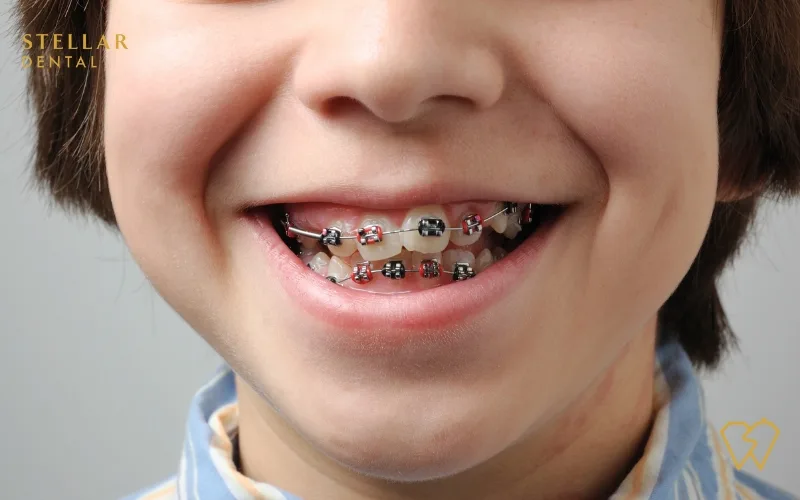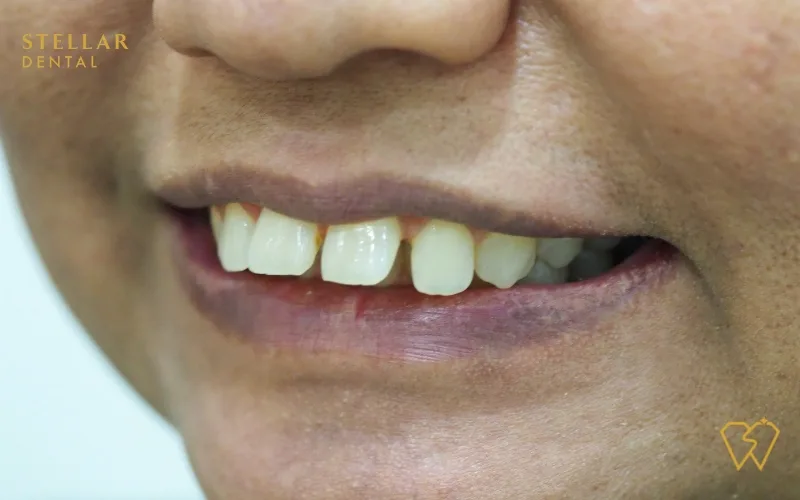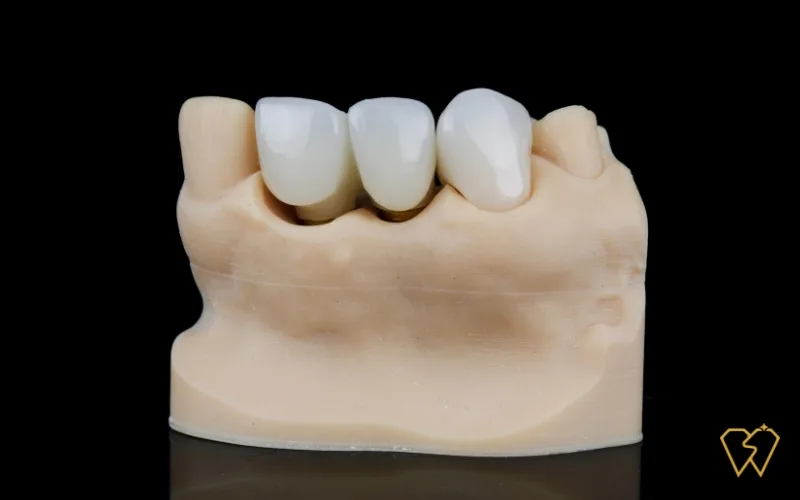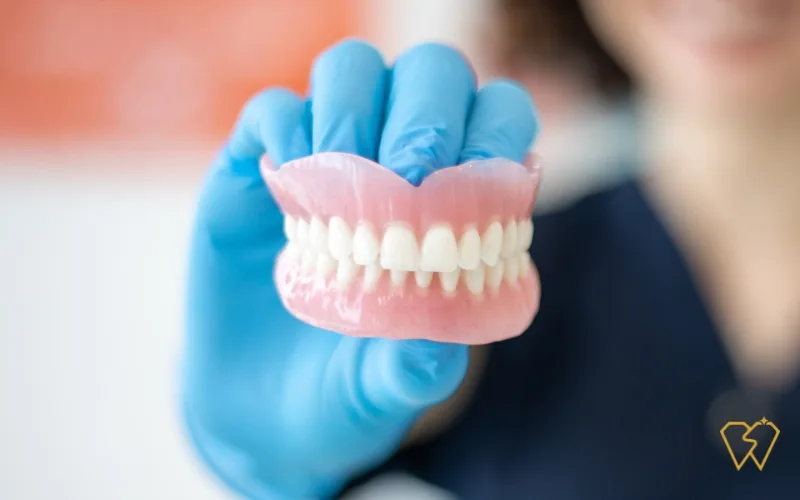Protruding teeth are a common dental issue that affects many people worldwide. It can impact a person’s confidence and oral health, leading to difficulty in chewing and speaking and an increased risk of oral health problems. This article will discuss the causes of protruding teeth, the associated health problems, the available treatment options, and preventative measures to maintain good oral health.
What are protruding teeth, and how do they affect a person’s smile?
Protruding teeth are a type of dental malocclusion where the upper front teeth jut out from the mouth, resulting in an increased overjet. This condition can also cause the lower jaw to be pushed back, resulting in an overbite. In addition to causing an unattractive smile, protruding teeth can lead to various oral health problems.
One of the most significant impacts of protruding teeth is on a person’s bite. The inability of the upper and lower teeth to meet correctly can cause difficulty in chewing and speaking. Additionally, protruding teeth can lead to an increased risk of tooth decay and gum disease due to the uneven pressure distribution on the teeth and gums.
Beyond the physical effects, protruding teeth can also have psychological impacts on a person’s self-esteem and confidence. People with protruding teeth may feel self-conscious about their smile, leading to social anxiety and a reluctance to smile or speak in public.
Causes of protruding teeth
Protruding teeth can have a variety of causes. These can range from genetics to habits that develop over time. Here are some common causes to consider.
Genetic factors
One of the leading causes of protruding teeth is genetics. Studies have shown that if a person’s parents or close relatives have this dental condition, there is a higher chance that they will also develop it. This is because the size and shape of our jawbones are primarily determined by genetics, and if these are not aligned properly, they can lead to protruding teeth.

Thumb sucking
Thumb sucking is a common habit among children, but if it persists past the age of five, it can cause problems with dental development. This is because prolonged thumb sucking can put pressure on the front teeth, resulting in their forward shifting and protrusion.
Tongue thrusting
Tongue thrusting is another habit that can contribute to protruding teeth. This occurs when a person places their tongue against their front teeth while swallowing or speaking, putting pressure on the teeth and causing them to shift forward over time.
Mouth breathing
Mouth breathing, particularly during childhood, can also lead to protruding teeth. This is because breathing through the mouth can cause the muscles in the face and mouth to develop in a way that puts pressure on the teeth, causing them to shift forward and become misaligned.
Dental misalignments
Dental misalignments, such as crowded or crooked teeth, can also contribute to protruding teeth. When teeth are misaligned, it can cause some of them to push forward, leading to protrusion.
In some cases, more than one of these causes may contribute to protruding teeth development.
Health problems associated with protruding teeth
Protruding teeth can lead to various oral health problems, affecting your ability to chew, speak, and maintain good oral hygiene. Here are some of the common oral health problems associated with protruding teeth:
Difficulty in chewing and speaking
Protruding teeth can cause issues with chewing and speaking. When the upper and lower teeth do not meet properly, it can be challenging to chew and break down food. This can lead to digestive issues and malnutrition. Additionally, when the teeth protrude, they can interfere with the proper placement of the tongue, which can affect speech patterns and lead to difficulties in pronouncing certain words.
Increased risk of tooth decay
Protruding teeth can make it more difficult to effectively clean the teeth and gums, increasing the risk of dental carries. Food and bacteria can become trapped in the spaces between teeth, making it difficult to remove them with brushing and flossing. This can result in plaque accumulation, resulting in gum swelling, tooth decay, and other oral health problems.
Mouth injuries
Protruding teeth can also increase the risk of mouth injuries. When the teeth stick out, they are more susceptible to trauma and can be easily chipped, cracked, or broken. This can cause pain and discomfort, leading to more extensive dental work.
Self-esteem issues
Protruding teeth can significantly impact a person’s self-esteem and confidence. Many people feel self-conscious and embarrassed about their teeth, leading to social anxiety, depression, and other mental health issues.
Treatment of protruding teeth
Treatment for protruding teeth can be achieved through various methods, depending on the severity of the condition. Here are some of the most common treatment options:

Teeth braces
Braces are one of the most common treatments for protruding teeth. They work by gradually shifting teeth into their proper position using brackets, wires, and bands. Braces can be made of metal or transparent materials and are worn for an average of 2-3 years, depending on the individual’s needs. Braces are effective for treating many dental problems, including protruding teeth.
Clear aligners
Clear aligners are another popular treatment option for protruding teeth. They are made of transparent plastic material custom-fit to the patient’s teeth. Clear aligners work by gradually shifting teeth into their proper position over time. Patients typically wear a series of aligners for 20-22 hours per day, with each set worn for about two weeks before being replaced. Clear aligners are an excellent option for those wanting a more discreet treatment than traditional braces.
Retainers
Retainers are often used after braces or clear aligners to help maintain the new position of the teeth. They are custom-fitted to the patient’s teeth and are worn for a specific time each day. Retainers can be fixed or removable and can help prevent the teeth from shifting back to their original position.
Extractions
In some cases, removal of one or more teeth may be necessary to treat protruding teeth. This is typically done when the teeth are overcrowded or there is not enough room in the mouth for all teeth. Extractions may also be necessary if an underlying problem with the jaw causes the protrusion.
Surgery
Surgery may be necessary in severe cases to correct protruding teeth. This is typically done when an underlying problem with the jaw causes the condition or if other treatments have not been effective. Surgery may involve repositioning the jaw or removing a portion of the jawbone. The best treatment option for protruding teeth will depend on the individual’s specific needs and the severity of the condition.
How to prevent protruding teeth
While preventing protruding teeth due to genetic factors is not always possible, some preventative measures can reduce the risk. Here are some effective ways to prevent the development of protruding teeth:
Early orthodontic treatment
Early orthodontic treatment can help correct bite issues before they become more severe, preventing the need for more extensive treatment later in life. Orthodontic treatment may involve braces or other appliances to correct teeth alignment and improve the bite.
Discourage thumb sucking and tongue thrusting
Thumb sucking and tongue thrusting are common habits in children that can contribute to developing protruding teeth. Encouraging children to stop these habits at an early age can help prevent the misalignment of teeth and the need for orthodontic treatment in the future.
Correct mouth-breathing habits
Mouth breathing can also contribute to the development of protruding teeth. It can lead to the forward positioning of the teeth and jaw, which can cause the upper teeth to stick out. Correcting mouth-breathing habits can help prevent the development of protruding teeth.
Regular dental checkups
Regular dental checkups can help identify and address issues with teeth alignment and oral health before they become more serious. By catching these issues early on, your dentist can advise the preventive measures to reduce the risk of developing protruding teeth.
Conclusion
Protruding teeth can be a cosmetic and health concern, affecting not only the appearance of a person’s smile but also their ability to chew, speak, and maintain proper oral hygiene. However, individuals can achieve a healthy, beautiful smile with the right treatment options and preventative measures.
At Stellar Dental, our team of dentists in PJ near KL offers a range of orthodontic treatments, including braces, clear aligners, retainers, and more. Our experienced team of dental professionals can help you find the right solution to fit your unique needs and achieve optimal dental health. Don’t let protruding teeth hold you back from feeling confident in your smile. Visit Stellar Dental today for the best dental care possible.








